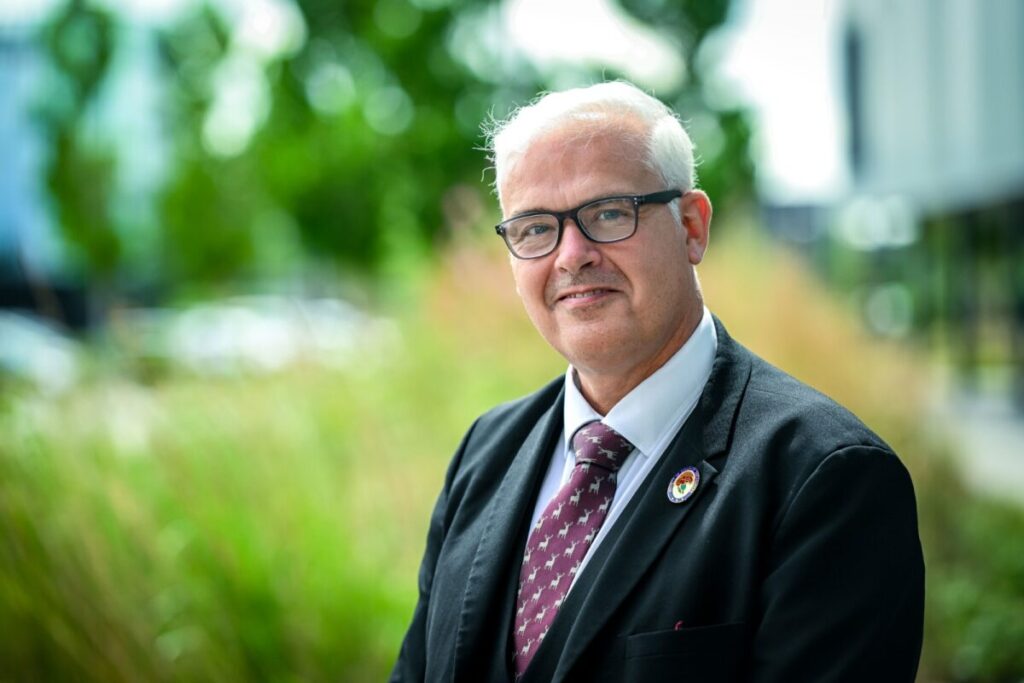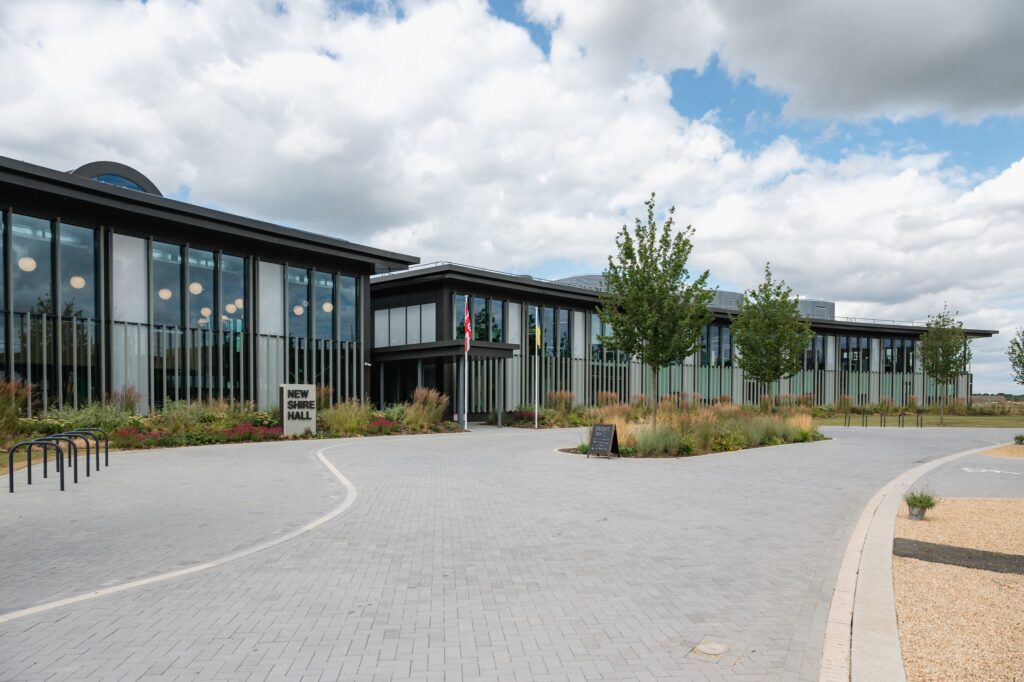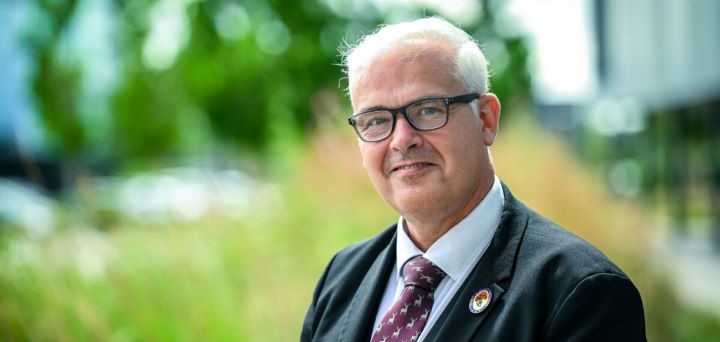Cambridgeshire County Council s151 officer and Society of County Treasurers president Michael Hudson discusses the positive difference he has made in his career so far and reflects on some of the biggest topics facing the local government finance sector.
Room151’s interview series with s151 officers is sponsored by CCLA Investment Management, whose work with local authorities dates back to 1961.

Making a difference. From their desk in a council office, it can sometimes be difficult for a section 151 officer to see how their actions and decisions link to people’s day-to-day lives. But there is no doubt they have an impact – whether good or bad.
Michael Hudson has worked in the public sector for more than 30 years, with a goal of making a positive difference to local residents, businesses and those working in his teams. The results of that ambition could be particularly fruitful in his relatively new role as executive director finance & resources at Cambridgeshire County Council, which he began four months ago. The scope of the role means Michael is also section 151 officer, giving him overall responsibility for the financial administration of the council’s £937m gross budget.
Speaking to Room151, Michael says the role offers a “tremendous opportunity” in terms of delivering to a “really ambitious programme” at the authority. “Our key focus is the customer journey, the customer experience, the customer outcome – how we take the teams that I lead at the authority to the next level in terms of the outcomes for the citizens of Cambridgeshire,” he says.
This focus seems particularly pertinent in generally troubling times for local authorities, with funding pared back, demand for services increasing, and recruitment and retention becoming more problematic – not to mention increased numbers of section 114s notices being issued and warnings of more to come.
There seems to be a problem with perception. Michael thinks more can be done to show both insiders and outsiders – as well as potential recruits – the importance of local government work. “I came into the public sector because of my belief in it and what it was doing, as well as my own experiences growing up with reliance on and support from public sector organisations,” he says. “In my career so far I’ve been incredibly privileged to have worked in some brilliant places underneath some fantastic people. I will always look to see what the end product is; what actually, as enabling services, we are helping to deliver on the ground.
“I think when you can explain that to an accountant, people in property, or somebody in IT – that actually what you’re doing makes a difference to people’s lives – that’s an added element of motivation. And when you talk about recruitment and retention in our sector, I don’t think we make enough play of the difference that we make as a local authority to people’s lives, be they disabled, in poverty, in need of significant care – we do all of that alongside the highways and the waste collection and disposal.
“You’ll never get anywhere as diverse as a local authority for the level of experience and ability to influence your community that you work in. Every day, every one of us will be involved with one service at least of a local authority and when you put it in that perspective, that can put a smile or a frown on somebody’s face depending on how we deliver it. We need to make sure that we’re working to the best of our abilities to put that smile on people’s faces.”

Michael is also keenly aware of the “incredible privilege” of being a section 151 officer, likening the position to being “a custodian for a period of time in an organisation that’s been around for hundreds of years, and will be around for hundreds of years, whatever format it takes”.
Therefore, a s151’s focus has to be on continued financial stability, and sometimes that means taking difficult or unpopular decisions. “That’s recognising that the role of the s151 is there to ensure financial sustainability, and recognising that every pound that is coming into our pockets comes from a member of the public and we must never lose sight of that. Ensuring that it is spent well has always been at the forefront of my mind.”
Michael’s role also offers a “tremendous responsibility and pride” in developing the teams of the future. “I’ve had 11 members of my former teams that have gone on to be section 151 officers, and some that have gone on to become chief executives,” he says. “Having that ability for that brief period of time to help develop and shape their careers is probably the greatest achievement and one of the things I’m most proud of.”
In addition to his role at Cambridgeshire, Michael is also attempting to make a difference as president of the Society of County Treasurers this year – he is the longest serving member of the organisation with 14 years of involvement.
“I’ve had the privilege of working with all types of local authorities and the Society of County Treasurers has brought tremendous support, friendship and technical engagement over the years, unlike any other society I’ve worked in.
“I’m proud to be president for this year and have a real focus on that community and keeping the society members together. We’ve also got a real focus on bringing our deputies through. There’s that real sense of camaraderie through that society that it’s just tremendously supportive when you’re going through difficult times; we’re all there for each other.”
Addressing the audit backlog
Given his knowledge and experience, Michael is well placed to assess the big issues in the world of local government finance. Indeed, he recently gave evidence to a parliamentary select committee into financial reporting and audit – which is attempting to address the backlog of local audits in England. Michael’s evidence was given ahead of a range of proposals and actions being set out by Lee Rowley, parliamentary under-secretary of state for local government and building safety, on behalf of the Department for Levelling Up, Housing and Communities (DLUHC).
“I expect the committee will lean very heavily into what Lee Rowley had to say, and so we will see recommendations akin to that,” Michael thinks. “It will be interesting to see where the committee goes on things like the format of the accounts, the engagement with [the newly-launched] Office for Local Government (Oflog), and some of the other issues aside from what DLUHC has picked up.
“I think we’ll see further carry on from Sir Tony Redmond’s recommendations around the focus and purpose of the accounts, and the need for greater focus on value for money.”
15th Annual LATIF & FDs’ Summit – 19 September 2023
250+ Delegates from Local Government & Investment
Michael has been involved in a number of meetings with DLUHC, and he welcomes their engagement with relevant parties across the sector. “I think the signs are promising that we’ll have an outcome,” he adds. “I think there’s going to be a compromise somewhere along the line in terms of what that outcome means either for auditors or the local authorities. We’re highly likely to see disclaimer opinions issued. The question is, which years and which authorities will experience those disclaimers, and the most radical solution could see that nearly all local authorities experience a disclaimer.
“But I think we need to be really clear as to reasons for that disclaimer, because normally they are issued when there’s insufficient evidence to undertake the audit. That is absolutely not the case, a local authority like Cambridgeshire and others up and down the country have got sufficient evidence, it’s just we haven’t got sufficient audit capacity to complete them.”
Michael thinks it will take around two years to get back to a ‘normal’ situation in audit. Beyond a blanket disclaimer and reset for next year – along with hoping there is enough recruitment in the system – he thinks the review that’s been carried out by the Treasury, the Financial Reporting Council and the Chartered Institute of Public Finance and Accountancy (CIPFA) around the valuation of infrastructure is greatly needed, as is pragmatism around pension fund assets on the balance sheet.
“I think if that’s done, we can get to a healthier situation,” Michael states. “But we also need to learn the lessons from the past as to how we got here, with the audit sector, and I think those are being taken on board.
“I reiterate the fear that I noted at the committee, in that when the Audit Commission did this back in the late 80s/early 90s, resourcing up the District Audit came from local authorities, attracting the accountants out of the local authorities into the audit sector, and teams are struggling to retain and recruit accountants. That would just shift the problem from one side to the other, so hopefully we can find a balance. I’ll remain optimistic that we can find a way through, because we’re all focused on getting that done and I hope that means collectively we can.”

A section 114 crisis?
Another big topic facing those in local government finance is the spate of section 114 warnings being seen in the sector, and the situations of those authorities who have already been issued with a section 114 notice – with Woking a notable recent example. Hudson thinks the local authority landscape could ultimately be positively affected as a result, though.
“If you look at Northamptonshire through to Woking, with others in between, what was happening there was a situation crystallising around a financial risk based largely upon commercial ventures. That’s reflected a position whereby those organisations were not identifying and not addressing those risks. That ultimately led to the reasons for the s114. If you look at the issuing of the s114, there were none that were issued by serving s151 officers. The first one was an interim and that trend progressed,” he notes.
“What is interesting to look at, and reassuring for DLUHC and the sector, is now we’ve got serving s151s that are actively considering this not as a matter of last recourse but as a matter as what it was originally intended to be, in terms of flagging to members’ attention and leaderships’ attention that we need to do something. If you look at the situations around Southampton, Kent and other such authorities, it is the s151 with CIPFA saying ‘no, you need to take the actions that you set out and you need to do this’.
“We’ve seen a number of best value reviews or peer reviews done at other places like Shropshire or Wirral that have alluded to it, and we’re now progressing to the next phase, where this should be seen constructively. We need to then lead from that the debate about how strong is the financial funding for local government, how resilient are local authorities based on their risk, and that’s a proper conversation to be had – when you look back at the likes of Thurrock, for example – those conversations were never happening, or if they were then they certainly weren’t getting to the openness and transparency that you’d expect to then have actions coming out of those.”
Michael sees this as a healthier state of affairs. “There are always going to be exceptions to every rule, but I think it’s a lot more at the forefront of people’s minds,” he states. “It’s a lot more recognised as a tool in the armoury for the s151s, and people are asking more and more questions. What is our reserves position? What is our commercial risk? There is more scrutiny from leadership and members because of the swell of interest.”

Building a legacy
Despite being in a good financial position, Cambridgeshire County Council is not immune to the wider issues, and faces its own challenges.
“Traditionally it has not been a well-funded area from central government. Reliance on council taxes is huge,” Michael explains. “Within our treasury management focus, we have a number of commercial ventures, including a wholly owned housing development company, This Land. That has been successfully led and managed in terms of the risk of that, but when we look at the Oflog statistics, Cambridgeshire has a higher capital financing position than most local authorities because of the sunk investment into that development company.
“Treasury management is a huge focus for us in terms of the current situation with a number of our loans maturing and needing to refinance whilst also then looking at future repayments, and repayments of loans from This Land.
“[The housing development company] is something to monitor, the risk register includes this, the risk assessment covers this, and we recently took a report to our Strategy and Resources committee, identifying and assessing the risks around the company, in terms of the viability of repayment. We’ll continue to monitor that in an open and transparent way.
“Thankfully we’ve got a fantastic team and good advisors. We’re presently going through a refinancing exercise, looking at our options to try and find solutions that are going to see us through without a significant increase in our cost base.”
But for Michael, the challenges are dwarfed by the opportunities at Cambridgeshire. “I came because it was a really exciting opportunity, with a new leadership team and a really progressive vision. It was sold as a progressive, supportive and compassionate leadership culture and I’m really pleased to say I’ve found all that.
“There’s an awful lot to do and high expectations for a joint administration that’s been in now for 18 months and a chief executive that’s been in for 14 months. I’ve had to hit the ground running but in the teams that I’ve got, there’s a real strength in depth across it.
“My background is more in the turnaround of councils, where you’ve got to really build from the ground up. Here, that’s not the case. We’ve got tremendous skill and capability within the teams that I’ve got, it’s just now pointing them in the right direction and being able to deliver everything that we’ve got to do.”
If he is successful in doing that, then it is likely that by the end of his tenure Michael will indeed have made a very significant difference to the lives of residents, to the fortunes of local businesses, and to the career paths of his colleagues – and the smiles will vastly outweigh the frowns.
Room151’s interview series with s151 officers is sponsored by CCLA whose work with local authorities dates back to 1961.
Our most recent interviews in the series have featured Peterborough City Council’s Cecilie Booth on navigating a path to financial stability and Slough Borough Council’s Adele Taylor on what it means to take on a role as a section 151 officer in an authority under government intervention.
—————
FREE weekly newsletters
Subscribe to Room151 Newsletters
Follow us on LinkedIn
Follow us here
Monthly Online Treasury Briefing
Sign up here with a .gov.uk email address
Room151 Webinars
Visit the Room151 channel













